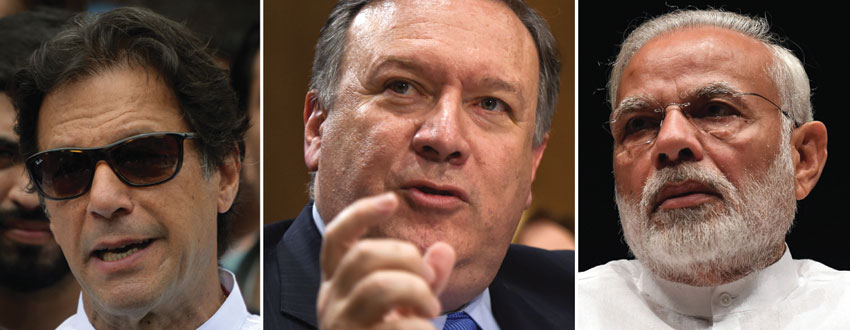Pentagon Gives Imran Khan Space to Improve Indo-Pak Relations
(L-r): Pakistan’s new prime minister Imran Khan. (Aamir Qureshi/AFP/Getty Images); U.S. Secretary of State Mike Pompeo. (Andrew Caballero-Reynolds/AFP/Getty Images); Indian Prime Minister Narendra Modi. (Prakash Singh/AFP/Getty Images)
The Trump administration wants to give new Pakistan Prime Minister Imran Khan space to explore opportunities to improve relations with India, a senior Pentagon official has said, writes Lalit K. Jha.
Many new governments come to power in Islamabad and want to improve the relationship with India, but then soon face realities and all the difficulties, Randall G. Schriver, U.S. Assistant Secretary of Defense for Asian and Pacific Security Affairs said at an event organized by Carnegie Endowment for International Peace in Washington, D.C.
“We want to give the new prime minister of the new government of Pakistan space to explore where there may be opportunities to improve relations with India,” he said.
He was responding to a question from moderator Ashley Tellis from Carnegie on the triangular relationship between India, the U.S. and Pakistan.
“But in terms of separating what was said during the campaign and what he said since the election, we want to give him space to find the opportunities to improve things with India,” Schriver said.
Responding to a question on giving space to Khan, he explained that this is in the context of India-Pakistan relationship and this does not indicate any change in the policy of the Trump administration with regard to Pakistan.
The Pentagon official insisted that this means no change in its policy towards Islamabad and its current approach of cutting financial assistance would continue.
“What I said about giving him space was really in the context of the India-Pakistan relationship. We’d certainly like to give him space to make the right decisions on a variety of things,” he said.
“But our approach of cutting assistance and pressuring Pakistan on their relationship with the Taliban, persuading them to come to the table, dealing with terrorist networks, that’ll be sustained. When I say give space, it’s not changing our approach or our policy. It is the context of developing opportunities between India and Pakistan,” Schriver said.
The Pentagon also cautioned Pakistan on seeking massive financial assistance from China, which risks its sovereignty.
“If you look at other examples where countries went all in, or largely in with China, the results have not been particularly good. There has been an erosion of sovereignty and an erosion of control. There are many examples of that,” he said.
“So, if our friends in Pakistan want to talk about a way out of that or want to talk about strengthening their economy and deal with that, I’m sure we’d be open to that and trying to work with Pakistan, work either bilaterally or through international institutions to try to get them on a better path, Schriver said.
The U.S., he said, is not interested in a failed Pakistan by any stretch of the imagination.
“We want them to be successful. We want them to have sovereign control and not cede that to any outside party, including China. And the economic piece is probably going to be key to that,” he said.


